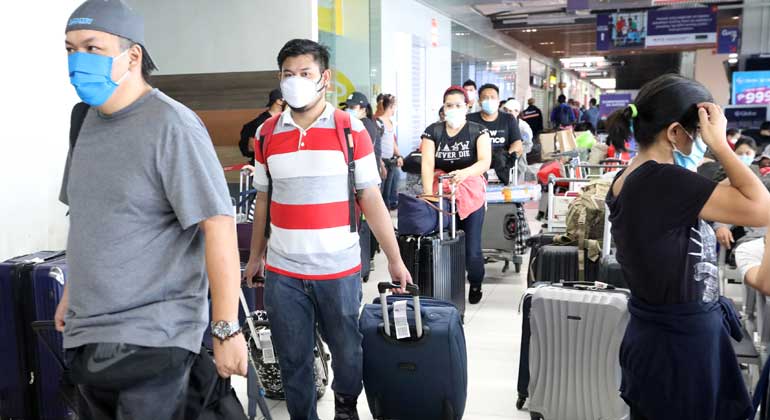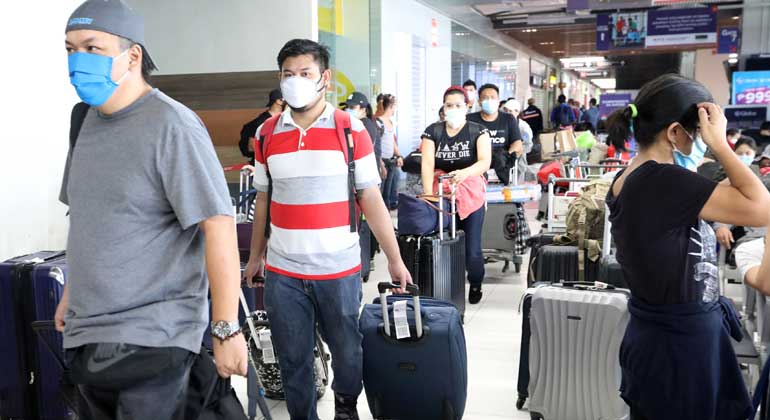Probe on safety of resettlement sites sought in House
A RESOLUTION calling for an inquiry into the safety of relocation sites and structural integrity of housing units in areas vulnerable to natural hazards has been filed at the House of Representatives. “There is a need to inquire into the safety of the relocation sites and the integrity of the housing units and other infrastructure in the resettlement areas in the country in order to create laws and regulations that will effectively and efficiently promote the disaster resiliency of our housing resettlements,” Bahay Party-list Rep. Naealla Bainto-Aguinaldo said in a statement over the weekend. Ms. Aguinaldo, who co-chairs the House committee on housing and urban development, filed the still unnumbered resolution after residents of resettlement sites such as Kasiglahan Village in Montalban, Rizal were forced to flee due to severe flooding during the onslaught of Typhoon Ulysses (international name: Vamco) in the second week of November. “There is also information that some structures in the village collapsed during the surge of said typhoon,” the lawmaker said. Ms. Aguinaldo said the government needs to assess whether resettlement sites in the country are “indeed safe… If they are not, then the government may need to consider relocating these communities or take steps to mitigate the threats posed by natural calamities brought about by storms like Typhoon Ulysses.” She noted that Kasiglahan Village was also flooded in 2014 due to Tropical Cyclone Luis. In recent years, there have been multiple flooding incidents reported in the same area. Ms. Aguinaldo also cited in the resolution that Republic Act No. 10121, or the Philippine Disaster Risk Reduction and Management Act of 2010, mandates the creation of coordination mechanisms and programs “with continuing budget appropriation on disaster risk reduction from national down to local levels towards building a disaster-resilient nation and communities.”– Kyle Aristophere T. Atienza
Almost 320,000 OFWs back to hometowns

ALMOST 320,000 overseas Filipino workers (OFW) have returned to their home provinces as of Nov. 21 since the start of the coronavirus pandemic early this year, the Labor department reported on Sunday. In a statement, the Department of Labor and Employment (DoLE) said “319,333 OFWs were transported to their respective provinces as of Saturday,” with assistance from the government. The DoLE provided coronavirus RT-PCR testing, a requirement by most local governments for returning residents and OFWs displaced by the global pandemic. Labor Secretary Silvestre H. Bello III said the OFWs who have come home will also be given support through livelihood programs. “We have also enhanced our livelihood programs for the reintegration of our returning heroes,” Mr. Bello said. — Gillian M. Cortez
House to propose P5-B increase in 2021 calamity fund
THE HOUSE of Representatives will seek an increase of at least P5 billion in the 2021 calamity fund for the reconstruction of areas devastated by recent strong typhoons, Speaker Lord Allan Q. Velasco said over the over weekend. Mr. Velasco said the House will propose the increase during the bicameral conference on the proposed P4.506-trillion national budget for next year. The two chambers of Congress will convene after the Senate approves its version of the budget. Mr. Velasco noted that the House passed the 2021 spending bill before typhoons Quinta, Rolly and Ulysses (international names: Molave, Goni, and Vamco) wreaked havoc in many parts of the country, especially in Luzon. “Given the tremendous damage caused by these successive strong typhoons, it is imperative that we augment the calamity fund in next year’s spending plan. We have to help our people rebuild their lives and their communities,” he said. Mr. Velasco noted that government agencies have so far estimated the damage caused by the three typhoons to infrastructure and agriculture at around P35 billion. Under the budget submitted by President Rodrigo R. Duterte to Congress in August, the calamity fund amounts to P20 billion, up by P4 billion from this year’s P16 billion. Of the total, P5 billion will go to the reconstruction of Marawi City while P6.25 billion would be augmentation for the quick response funds of six agencies. Of the P6.25 billion, P2 billion will go to the Department of Education, P1.25 billion to the Department of Social Welfare and Development, P1 billion to the Department of Agriculture, P1 billion to the Department of Public Works and Highways, P500 million to the Department of Health, and P500 million to the Department of National Defense-Office of Civil Defense. “That’s a total of P11.25 billion that is specifically appropriated, leaving a balance of P8.75 billion President Duterte could use to help victims of calamities and other disasters. That balance is not even enough to rebuild Bicol, which was hard hit by Typhoon Rolly,” Mr. Velasco said.
ALTERNATIVE
If the calamity fund could not be increased, he said, additional allocation could instead be given to agencies involved in the rehabilitation of typhoon-damaged communities. “Alternatively, we can allocate the additional money in the budgets of the agencies involved in reconstruction and helping typhoon victims,” Mr. Velasco said. “There are enough appropriations in the proposed budget from which the needed funds could be taken,” he added. — Kyle Aristophere T. Atienza
